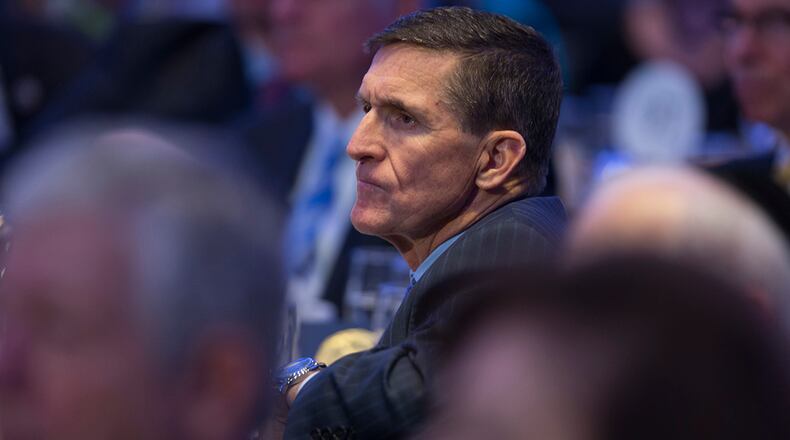How do you go rogue in a rogue administration?
At first glance, Mike Flynn seems to have found a way, which is allegedly why he was forced to resign as national security adviser last night, the first in what will probably be a series of high-level departures in an administration crumbling before our eyes.
Flynn's personal demise can be traced back to Dec. 29, the day that President Obama ejected 35 Russian diplomats as part of punitive sanctions against Russia. That day, Flynn conducted five separate phone conversations with the Russian ambassador in which he secretly suggested that better days were coming, that these sanctions would be reversed once Donald Trump took office some three weeks later.
Even under normal circumstances, the act of secretly communicating with a foreign adversary to undermine a sitting president represents an immense breach of protocol and perhaps even American law. And of course, these particular circumstances were far from normal. The sanctions in question had been imposed to punish Russia for its extensive hacking of U.S. targets, including its effort to interfere in U.S. elections on Trump's behalf.
As the FBI, the Department of Homeland Security and the Director of National Intelligence explained in a joint statement released that day:
"This activity by Russian intelligence services is part of a decade-long campaign of cyber-enabled operations directed at the U.S. government and its citizens. These cyber operations have included spearphishing, campaigns targeting government organizations, critical infrastructure, think tanks, universities, political organizations, and corporations; theft of information from these organizations; and the recent public release of some of this stolen information."
In short, you've got Russia hacking U.S. targets and secretly interfering on behalf of candidate Trump on a scale without parallel in U.S. history. You've got the United States then attempting to punish Russia. And you have the Trump team secretly undermining those efforts to punish Russia before it even takes office. Remarkable as those statements might be, none rely on speculation: These are things that we know to have happened.
Here's what we don't know but need to know:
In making those phone calls and offering those assurances to Russia, was Flynn operating on his own, without instructions from Trump himself? That seems highly unlikely for several reasons, including the fact that as a career military officer, Flynn is trained to respect the chain of command. It's hard to believe that he would dare to free-lance such an effort without approval from the only man who could give him approval.
Then you look at Trump's almost obsessive need to be liked and admired by Vladimir Putin, and at how closely his policy statements parallel those advanced by Putin. You also look at the timeline:
The sanctions against Russia were announced by President Obama on Dec. 29; within hours, Russia announced preliminary plans to retaliate with sanctions of its own, as is standard in such circumstances. But for some mysterious reason -- we now know that reason to be Flynn's phone calls -- Russian anger turned to calm and Russian officials suddenly changed course, canceling retaliatory sanctions. Putin took on the pleased air of a cat that had quietly swallowed the canary, and what a delicious canary it was.
Here's how President-elect Trump celebrated the news the next day, Dec. 30:
We also know now that despite presidential claims of ignorance, the Trump White House had been informed by law enforcement weeks ago of the content of Flynn's phone calls. Acting Attorney General Sally Yates had told the administration what an FBI investigation had uncovered, and she also warned that Flynn might be susceptible to blackmail by Russia because of the explosive nature of his conversations.
The Trump administration chose to do nothing with that information, and Flynn remained in good standing, his security clearance intact. In the end, he was forced to resign not because of what he had done, but because he had misled Vice President Mike Pence about the calls. Apparently, Flynn did not believe the vice president to be in the tight little circle of trust on such matters.
And what's the reaction to all this in Congress? Prior to Flynn's resignation, the head of the House Intelligence Committee had expressed a total lack of concern. “It just seems like there’s a lot of nothing there,” said U.S. Rep. Devin Nunes, R-Calif.
U.S. Rep. Jason Chaffetz of Utah, head of the House Oversight Committee, has also shown no interest in such issues. Instead, he has focused his committee on pressing matters such as how the Centers for Disease Control came to use Sid the Science Kid, a PBS pre-school cartoon character, in material explaining the Zika virus to children.
You know, important stuff.
UPDATE at 3 p.m.:
Did Mike Flynn act independently of then-President-elect Trump in reassuring Russia that sanctions would be revisited? In a press briefing Tuesday, White House spokesman Sean Spicer offered a two-point answer to that question:
About the Author
The Latest
Featured



